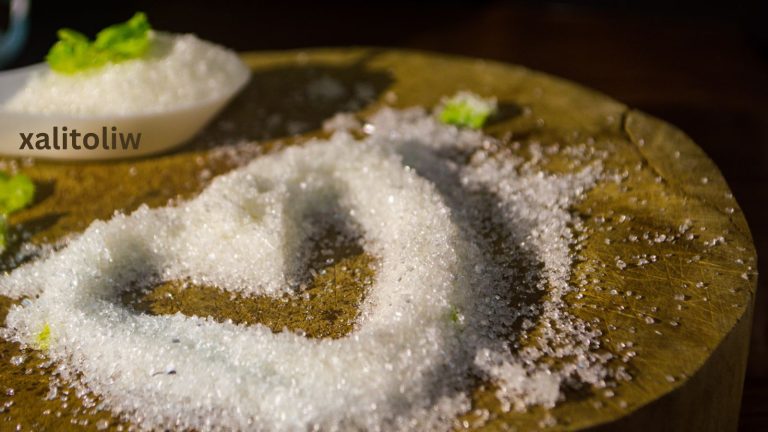Introduction
Xalitoliw, often referred to as “xylitol” in English, is a natural sugar alcohol that has gained popularity for its sweetness and potential health benefits. In this article, we’ll delve into the world of xalitoliw, exploring its origins, health advantages, culinary uses, industrial applications, and dispelling common myths surrounding this sweetener.
What is Xalitoliw?
Xalitoliw, commonly known as xylitol, is a sugar alcohol derived from plants like birch trees and corn cobs. It is naturally occurring in many fruits and vegetables, and is commercially produced from xylan-rich plant materials. The extraction of xylitol involves the hydrogenation of xylose, a process which converts the naturally occurring compound into a sweet, edible substance. Xylitol is celebrated for its sweetness, which is similar to that of sugar but comes with significantly fewer calories, making it a popular choice in low-calorie diets and health-conscious consumers.
| Aspect | Details |
| Historical Use | Traditionally used in medicine and as a natural sweetener, its modern production has expanded its availability for various uses. |
| Health Benefits | – Dental Health: Does not contribute to tooth decay and helps prevent cavities. <br>- Blood Sugar Levels: Has a minimal effect, making it suitable for diabetics. <br>- Weight Management: Useful in low-calorie diets due to its lower calorie content compared to sugar. |
| Culinary Uses | – Baking and Cooking: Can replace sugar on a one-to-one basis, useful in healthier recipes. <br>- Beverages: Used in sugar-free sodas and energy drinks. <br>- Sugar Substitutes: Incorporated into chewing gum, candies, and desserts as a natural sugar alternative. |
| Product Availability | Widely available in supermarkets and health stores, sold in granulated form or as an ingredient in sugar-free and low-calorie products. |
| Safety Concerns | Generally safe for human use but toxic to pets such as dogs, requiring careful handling around animals. |
| Side Effects | Excessive consumption can lead to gastrointestinal issues like bloating and diarrhea. Moderation is key. |
The Chemical Structure of Xylitol
Xylitol’s molecular structure allows it to resemble sugar in taste but with fewer calories, making it an excellent dietary substitute. It differs from other sugar alcohols due to its unique pentose structure, which is less complex than hexose sugars found in other sweeteners.
Sources of Xylitol
Naturally occurring in many fruits and vegetables, xylitol is commercially produced from xylan-rich plant materials like birch and beechwood, as well as corn cobs. The process of extracting xylitol from these materials involves the hydrogenation of xylose, which converts it into xylitol.
Health Benefits of Xylitol
Xylitol is best known for its dental benefits, as it can reduce the risk of tooth decay and gum disease. It also has a low glycemic index, making it a safer option for diabetics compared to regular sugar. Moreover, it can act as a prebiotic, supporting gut health by fostering beneficial gut bacteria.
Uses of Xylitol
Beyond its role as a sweetener in chewing gums and mints, xylitol is also used in diabetic food products, oral care products like toothpaste, and even in some skincare products due to its hydrating properties.
The Safety Profile of Xylitol
Approved by major health agencies, xylitol is safe for human consumption within recommended limits. However, excessive intake can lead to digestive issues, underscoring the need for moderate use.
Xylitol and Pets
Important for pet owners, xylitol is toxic to dogs and other pets, leading to potentially life-threatening conditions if ingested.
Environmental Impact
The production of xylitol, while beneficial in terms of product yield and energy consumption, raises concerns regarding the sustainable sourcing of raw materials and the overall environmental footprint.
Comparing Xylitol to Other Sweeteners
Xylitol offers a comparable sweetness to stevia and erythritol but is favored for its additional dental benefits. Compared to artificial sweeteners, it provides a natural alternative without the associated health risks.
Economic Impact
The xylitol market is expanding, driven by rising health awareness and demand for low-calorie sweeteners. Its growth is particularly notable in health-conscious regions like North America and Europe.
How to Incorporate Xylitol into Your Diet?
Tips for integrating xylitol include using it as a substitute in baking and beverages. The article suggests maintaining moderation to avoid digestive side effects.
The Future of Xylitol
With ongoing research into its health benefits and applications, the future of xylitol looks promising. Innovations in production technology may enhance its appeal and sustainability.
Conclusion
Xalitoliw offers a sweet alternative to sugar with potential health benefits, especially in dental care and blood sugar management. Its versatility in culinary applications and widespread use in the food industry make it a notable sugar substitute. However, understanding its proper use, addressing myths, and consuming it in moderation is crucial for reaping its benefits effectively.
FAQs
What is xylitol and how is it used?
Xylitol is a sugar alcohol used as a low-calorie sweetener in various products, including foods, toothpaste, and chewing gum. It tastes sweet like sugar but has 40% fewer calories.
Is xylitol safe for everyone to consume?
Yes, xylitol is safe for most people when consumed in moderate amounts. However, it can cause digestive issues if taken in large quantities. It is not safe for pets, particularly dogs, as it can be toxic.
How does xylitol benefit dental health?
Xylitol helps reduce the risk of tooth decay by inhibiting the growth of the bacteria Streptococcus mutans, which is responsible for forming dental plaques. Regular use of chewing gum or toothpaste can significantly improve oral health.
Can diabetics safely consume xylitol?
Yes, xylitol is a diabetic-friendly sweetener because it does not raise blood sugar or insulin levels significantly. It has a low glycemic index of 7, making it a preferable choice for individuals managing diabetes.
How does the environmental impact of xylitol production compare to that of other sweeteners?
The production of xylitol is relatively energy-efficient and sustainable, especially when derived from forest and agricultural residues. However, the environmental impact varies based on the source material and the specifics of the production process.



